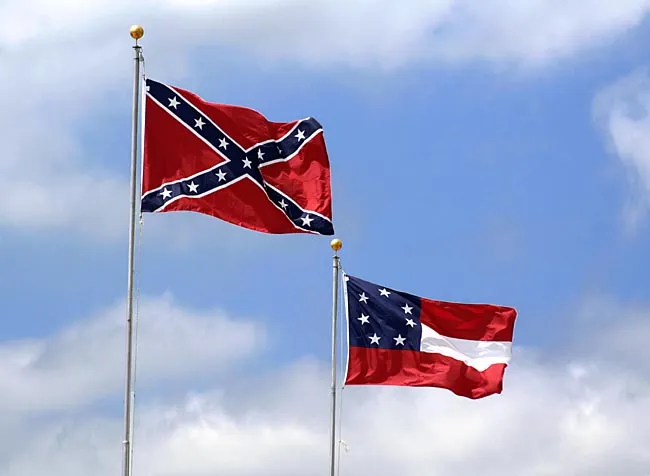Table of Contents
Naturally, Kentucky's GOP secretary of state Michael Adams was happy to announce that, for the first time in history, Republicans outnumber Democrats on Bluegrass State voter registration rolls.
“The birthplace of Lincoln has finally aligned with the party of Lincoln,” he declared.
“More like ‘aligned with the party of Strom Thurmond,’” challenged Dr. Brian Clardy, a Murray State University historian. He dismissed Adams’s claim as “complete and utter fiction.”
Oh, Clardy agrees that Kentucky is about as red as Republican states get. But the hero of most Kentucky Republicans — and most Republicans everywhere — is Donald Trump, not the Great Emancipator, according to Clardy.
He admits to pulling for Team Blue. But he argues that no way does the Trumpian GOP anywhere “mirror the principles of Lincoln in regard to inclusion and universal freedom. Lincoln favored an America that was democratic and yet, at the same time, republican and I mean small ‘d' and small ‘r.’”
The Republican Party, he added, is essentially a Trump cult, nowhere more so than in Kentucky.
Thurmond – the Democrat, turned Dixiecrat, turned Republican
No constituency is more loyal to the GOP than conservative, native-born white Southerners – many, if not most, of whose ancestors were white supremacist Democrats like Thurmond. A segregationist South Carolina senator, he helped kick off Dixie’s white flight to the GOP.
When a majority of 1948 Democratic national convention delegates — mostly northerners and westerners — voted to nail a civil rights plank into the party platform, Thurmond and other white Southerners stormed out in protest. He ran for president on the segregationist “States’ Rights Democratic” ticket.
Thurmond’s rallies featured Confederate flags and bands blaring “Dixie.” Dubbed a “Dixiecrat,” he carried his home state, plus Alabama, Mississippi, and Louisiana.
Two decades later, Democrats and Republicans in the House and Senate, encouraged by President Lyndon B. Johnson, a Texan, teamed up to pass the historic Civil Rights Act of 1964 and the Voting Rights Act of 1965.
White Southern Democrats, including Thurmond, vehemently opposed the civil rights bills. Thurmond joined fellow segregationist Southern Democrats in staging a 60-day filibuster — the longest one ever — against the Civil Rights Act.
Later in 1964, he switched to the GOP. Alabama-born Kentucky Sen. Mitch McConnell said he remembered “the excitement, having been a son of the deep South, when Sen. Thurmond decided to become a Republican.” In a 1997 speech, McConnell characterized Thurmond’s career as “distinguished.”
The “Southern Strategy”
By the 1970s, the old anti-slavery Republican Party of “Lincoln and Liberty” was in full retreat from its historic embrace of federal civil rights activism. That earlier support for civil rights, following the Civil War, had led to constitutional amendments abolishing slavery, making Blacks citizens, and extending the vote to African American men.
The GOP was veering ever rightward. Notably starting with the convert Thurmond and longtime Republican Sen. Barry Goldwater, GOP politicians began crying “states’ rights!” – the old Dixie code for slavery before the Civil War, and for Jim Crow segregation and African American disenfranchisement afterwards. (Goldwater ran for president in 1964 and lost, but he further cracked the Democratic “Solid South” by winning Alabama, Georgia, Louisiana, Mississippi, and South Carolina. He also carried his native Arizona.)
Pushed by President Richard Nixon, who was elected in 1968, the GOP “Southern strategy” based on racial dog-whistle politics won over thousands of white Democrats who hated to see Jim Crow go. (The “Southern Strategy” was also designed to siphon votes from segregationist former Alabama Gov. George Wallace’s independent candidacy in Dixie.)
President Ronald Reagan opened his 1980 campaign in Mississippi, firing up an all-white crowd by promising he was for “states’ rights.” He took the “Southern Strategy” nationwide with more dog-whistle pandering to whites up north and out west, too. (Audio uncovered in 2019 revealed that Reagan could be overtly racist in private.)
Trump, who supplanted Reagan as the beau ideal president of the Republican hard right, forsook the dog whistle for the bullhorn. In 2016 and 2020 Trump ran the most blatantly racist presidential campaigns since those of Thurmond and Wallace.
When Trump promised to “Make America Great Again,” he meant for whites to hear “Make America White Again.” In 2019, the the Sacramento Bee editorialized:
“Trump’s increasingly racist rhetoric has stunned political observers, yet he’s simply playing to a constituency that was cultivated over decades by people like Nixon and Reagan. They may have operated on a more subtle level, saving the worst of their bigotry for private conversations instead of declaring it in tweets. Yet the core principle remains the same: racism.”
Though a border state, Kentucky was part of the “Solid South.” Segregation was the law and the social order here, too. Even so, it took the state a while longer to join the white exodus to the GOP from the former slave states. Today, as in the old Confederate states, the Kentucky Republican Party is largely what the Democrats used to be: the white folks’ party.
Adams and other Kentucky Republicans hotly deny that race has anything to do with the state’s shift to the GOP. But the Republican party has deftly tapped into the politics of white resentment, notably in largely rural states like 87.1 percent white Kentucky. In the last session of the legislature, the GOP supermajority House and Senate passed, over Gov. Andy Beshear’s veto, legislation that limits how teachers can teach about race. The legislation mirrored the national right-wing white furor over critical race theory, the scholarly study of systemic racism in law and society. CRT is taught in law schools and some graduate schools, not in elementary and secondary schools.
“Trump gave [whites] permission to voice their prejudices,” said veteran Kentucky journalist Bill Straub. “A lot of white folks — not all white folks — look nationally and see that folks like Latinos and African Americans are starting to become more influential and demanding their rights. White folks, to a large degree, are not comfortable with that.”
Straight F's from the NAACP
In 1909, the centennial of Lincoln’s birth, Blacks and some progressive whites founded the NAACP. “Lincoln and the NAACP are linked by the precious and mystical cords of history, memory, and freedom in American life," said Dr. Clement Price, a Rutgers University-Newark history professor.
Since 1914, the NAACP has issued a Civil Rights Federal Legislative Report Card, which scores senators and representatives on how they vote “on legislation of critical importance to the African American community and other friends of civil rights.”
Kentucky Sens. McConnell and Rand Paul and all five GOP congressmen rate rock-bottom “F’s” on the current report card. (Congressman John Yarmuth, the state’s only Democrat in Washington, rates an “A” with a 97 percent score.)
Others debunk the Lincoln link
Adams is hardly alone in linking the Trump GOP of 2022 to Lincoln’s party of 1860. Nor is Clardy out on a limb by himself in disputing such claims.
“Republicans are fixated on the idea that their party is connected to the party of President Lincoln, whose party also bore the name Republican,” wrote Peter Balakian in Literary Hub online as the 2020 election drew near.
Added the Pulitzer Prize-winning poet and Colgate University humanities professor: “During this election season, they keep evoking the hallowed connection again saying ‘the Republican Party is the party of Lincoln.’ Republicans want to imagine that there is a grand tradition between the Republican Party of the Reagan era and Abraham Lincoln’s federal interventionist party of 1861.
“....Today’s Republicans, with their passion for states’ rights, their protection of the white supremacist segments of American society, their aversion to ethical federal pro action, have more ideological connections with the slaveholding southern Democrats of the 1860s than they do with Lincoln’s party.”
Writing in Salon last year, Matthew Rozsa acknowledged, “Of course, it’s true that Abraham Lincoln was the first Republican president,” but he argued that “the modern Republican Party has no right to cite the 16th president's name. It is utterly impossible to reconcile his values with those of his successors 160 years later.”
Rozsa didn’t pull punches: “The Republican Party is, decisively, no longer the party of Lincoln. You cannot square Lincoln’s free labor ideology with a party that unanimously opposed President Joe Biden’s stimulus bill (and also opposed all of Barack Obama’s efforts to restart the economy during the Great Recession). You cannot square Lincoln’s support for labor in general with a party that actively ignores poor and working-class people and whose efforts at pandemic relief disproportionately aided the wealthy.
“Similarly, you can’t square the modern party’s dehumanizing of immigrants, women, the LGBTQ community, and people of color with Lincoln’s ideals. Lincoln was a man with many of the prejudices of his time, but his great redeeming quality was his ability to learn from his mistakes and his willingness to overcome his limitations. Left to his own devices, he instinctively moved toward compassion and generosity. The modern Republican Party instinctively moves away from those things.
“Finally, it’s impossible to square Lincoln’s prosecution of the Civil War with a party that refused to convict Trump for inciting the Jan. 6 riot and is now desperately trying to shove that insurrection attempt down the memory hole. First of all, Lincoln literally used military force to put down a rebellion sparked by unhappiness over an election result. In 1864, Lincoln was deeply worried he might lose to Democratic nominee George McClellan, his former commanding general, whom Lincoln feared would be unable to save the Union. Despite that, Lincoln never even considered whipping his supporters into a frenzy or rejecting the verdict of the voters if McClellan defeated him. He respected the importance of elections and democracy, even at the potential cost of his presidency and the nation itself.”
The Confederate Party?
Like Lincoln, Confederate President Jefferson Davis was a Kentucky native. While Lincoln hoped the Kentucky Union Party could keep the state loyal, Davis counted on the state’s Southern Rights Party to coax Kentucky into the Confederacy. The Davis party lost; Kentucky was one of four slave states that remained under the Stars and Stripes.
Even so, Jim Crow laws and racism are part of Kentucky’s history too – as is the adoption of the Republican playbook.
“To maintain and keep power, Trump and the Republicans have embraced the white supremacist ideology, politics, and symbols of the Confederacy,” Chauncey Devega wrote in Salon. “This began in the 1960s with a backlash against the civil rights movement, first with 1964 Republican nominee Barry Goldwater, and then with Richard Nixon’s “Southern strategy,” meant to appeal to white racists who rejected the civil rights movement. More than five decades later, right-wing appeals to racism and white supremacy are in some ways less restrained with the rise of Trumpism.
“... Donald Trump is really a 21st-century Jefferson Davis, president of the treasonous Confederacy.”
“Perhaps Donald Trump, not Jefferson Davis, will go down in history as the last president of the Confederacy,” mused Washington Post columnist Eugene Robinson.
Based on the number of Trump and Confederate flags that flutter in Bluegrass State breezes, often in tandem, and the dearth of Lincoln imagery beyond his birthplace of Hodgenville, the Confederacy’s only president and the country's last GOP president are more popular in red state Kentucky than the Great Emancipator.
Full disclosure time: This historian is partial to Team Blue, too. But “the birthplace of Lincoln has finally aligned with the party of Lincoln?” No, Mr. Adams, you are wrong. “The birthplace of Davis has finally aligned with the party of Davis” is more like it.
The birthplace of Lincoln has finally aligned with the party of Lincoln? No, Mr. Adams, you are wrong. The birthplace of Jefferson Davis has finally aligned with the party of Davis.
--30--








